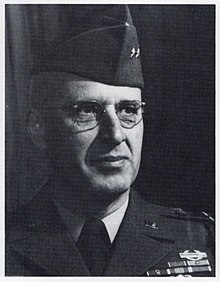Guy S. Meloy
| Guy S. Meloy Jr. | |
|---|---|

General Guy S. Meloy Jr.
|
|
| Born |
September 4, 1903 Lanham, Maryland, U.S. |
| Died | December 14, 1964 (aged 61) |
| Buried | Arlington National Cemetery |
| Allegiance | |
| Service/ |
|
| Years of service | 1927–1963 |
| Rank |
|
| Commands held | United Nations Command, Korea U.S. Forces Korea Eighth Army Fifth Army VII Corps 1st Infantry Division Infantry School |
| Battles/wars |
World War II Korean War Cold War |
| Awards |
Distinguished Service Cross Distinguished Service Medal Legion of Merit Bronze Star Purple Heart Army Commendation Medal Combat Infantryman Badge |
General Guy Stanley Meloy Jr. (1903–1964) was a U.S. Army general, World War II and Korean War veteran, and served as commander of all U.S. forces in Korea during the Cold War.
Meloy was born in Lanham, Maryland on September 4, 1903. After graduating from McKinley Technology High School in Washington D.C., he was appointed to the United States Military Academy. He graduated from West Point in 1927 with a Bachelor of Science degree and was commissioned as a second lieutenant in the infantry.
One of his early assignments was with the first tank destroyer battalion to be organized in the United States Army. He followed this assignment by attending the British Army's anti-tank school, and upon his return to the U.S. was assigned to Camp Hood (later Fort Hood) as one of the first five officers at the now defunct Tank Destroyer Center. During World War II he served in Europe as chief of staff of the 103rd Infantry Division, and was chief of staff of the Airborne Center at Fort Bragg, North Carolina.
From 1946 to 1948 he was professor of military science and tactics at Texas A&M University. He next served as commander of the 19th Infantry Regiment(United States) of the 24th Infantry Division at Camp Chickamauga in Beppu, Kyushu, Japan.
He deployed to the Korean War, where as a high-ranking officer he was seriously wounded. Later he commanded the United States Army Infantry School at Fort Benning, and the 1st Infantry Division in Europe, where he oversaw the unit's redeployment to Fort Riley. He was the Chief of Public Information at the Department of the Army and later commanded Fifth United States Army at Fort Sam Houston in 1958 and then served as the commander of VII Corps in Europe.
...
Wikipedia
